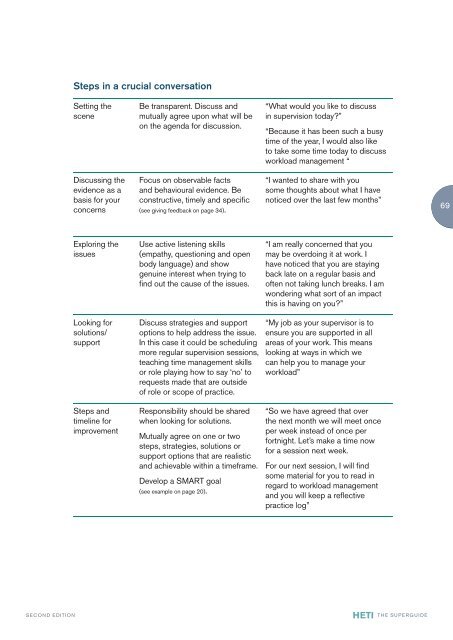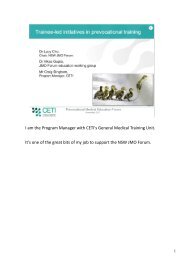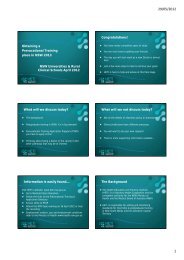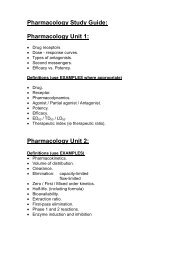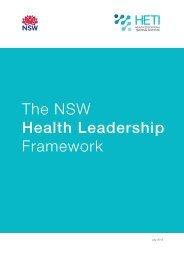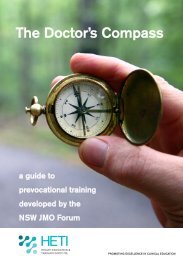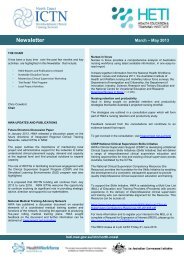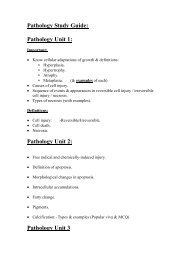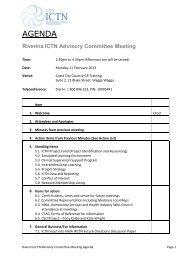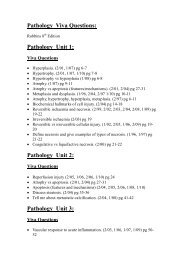a handbook for supervising allied health professionals - HETI - NSW ...
a handbook for supervising allied health professionals - HETI - NSW ...
a handbook for supervising allied health professionals - HETI - NSW ...
You also want an ePaper? Increase the reach of your titles
YUMPU automatically turns print PDFs into web optimized ePapers that Google loves.
Steps in a crucial conversation<br />
Setting the<br />
scene<br />
Discussing the<br />
evidence as a<br />
basis <strong>for</strong> your<br />
concerns<br />
Exploring the<br />
issues<br />
Looking <strong>for</strong><br />
solutions/<br />
support<br />
Steps and<br />
timeline <strong>for</strong><br />
improvement<br />
SECOND EDITION<br />
Be transparent. Discuss and<br />
mutually agree upon what will be<br />
on the agenda <strong>for</strong> discussion.<br />
Focus on observable facts<br />
and behavioural evidence. Be<br />
constructive, timely and specific<br />
(see giving feedback on page 34).<br />
Use active listening skills<br />
(empathy, questioning and open<br />
body language) and show<br />
genuine interest when trying to<br />
find out the cause of the issues.<br />
Discuss strategies and support<br />
options to help address the issue.<br />
In this case it could be scheduling<br />
more regular supervision sessions,<br />
teaching time management skills<br />
or role playing how to say ‘no’ to<br />
requests made that are outside<br />
of role or scope of practice.<br />
Responsibility should be shared<br />
when looking <strong>for</strong> solutions.<br />
Mutually agree on one or two<br />
steps, strategies, solutions or<br />
support options that are realistic<br />
and achievable within a timeframe.<br />
Develop a SMART goal<br />
(see example on page 20).<br />
“What would you like to discuss<br />
in supervision today”<br />
“Because it has been such a busy<br />
time of the year, I would also like<br />
to take some time today to discuss<br />
workload management “<br />
“I wanted to share with you<br />
some thoughts about what I have<br />
noticed over the last few months”<br />
“I am really concerned that you<br />
may be overdoing it at work. I<br />
have noticed that you are staying<br />
back late on a regular basis and<br />
often not taking lunch breaks. I am<br />
wondering what sort of an impact<br />
this is having on you”<br />
“My job as your supervisor is to<br />
ensure you are supported in all<br />
areas of your work. This means<br />
looking at ways in which we<br />
can help you to manage your<br />
workload”<br />
“So we have agreed that over<br />
the next month we will meet once<br />
per week instead of once per<br />
<strong>for</strong>tnight. Let’s make a time now<br />
<strong>for</strong> a session next week.<br />
For our next session, I will find<br />
some material <strong>for</strong> you to read in<br />
regard to workload management<br />
and you will keep a reflective<br />
practice log”<br />
<strong>HETI</strong><br />
THE SUPERGUIDE<br />
69


